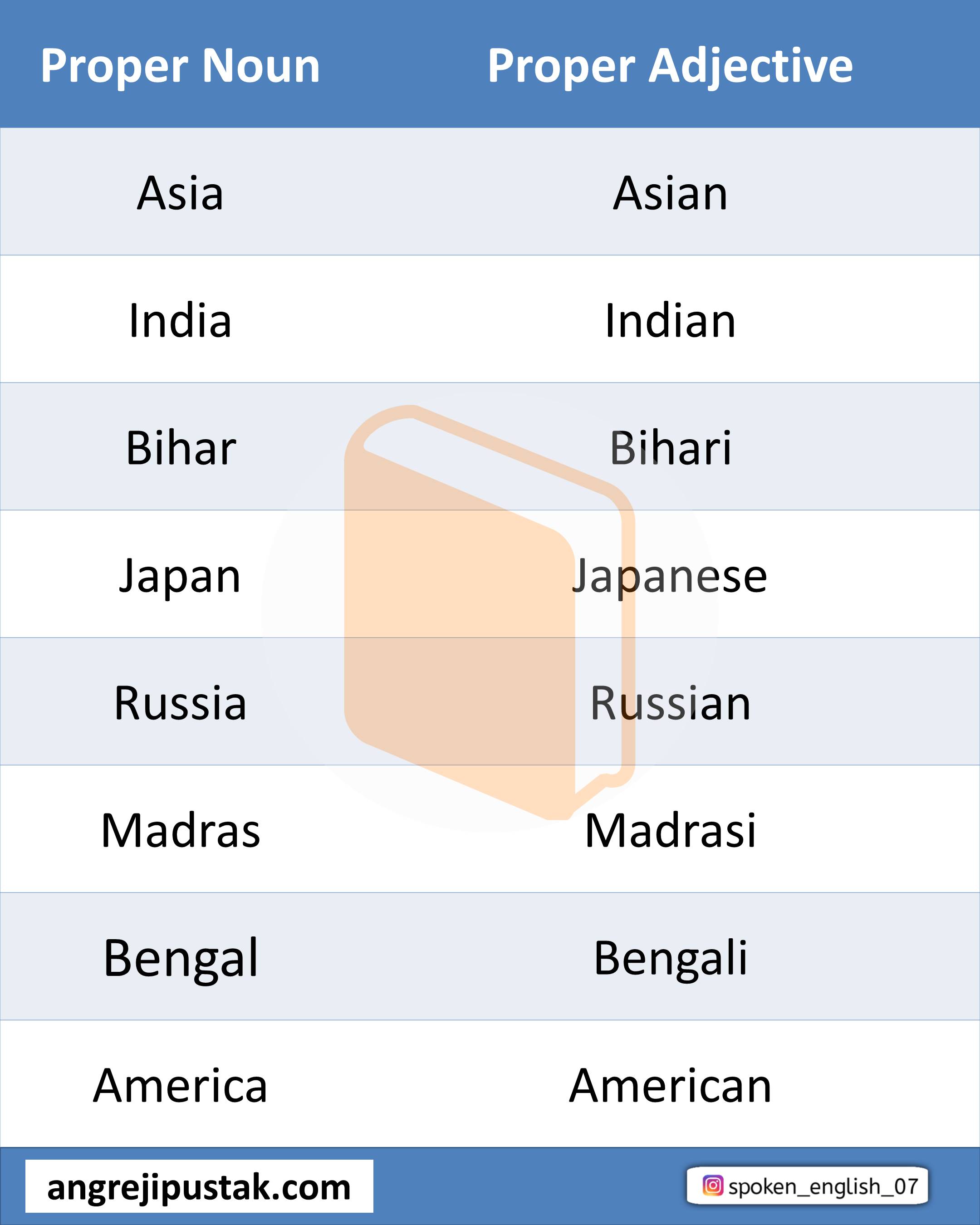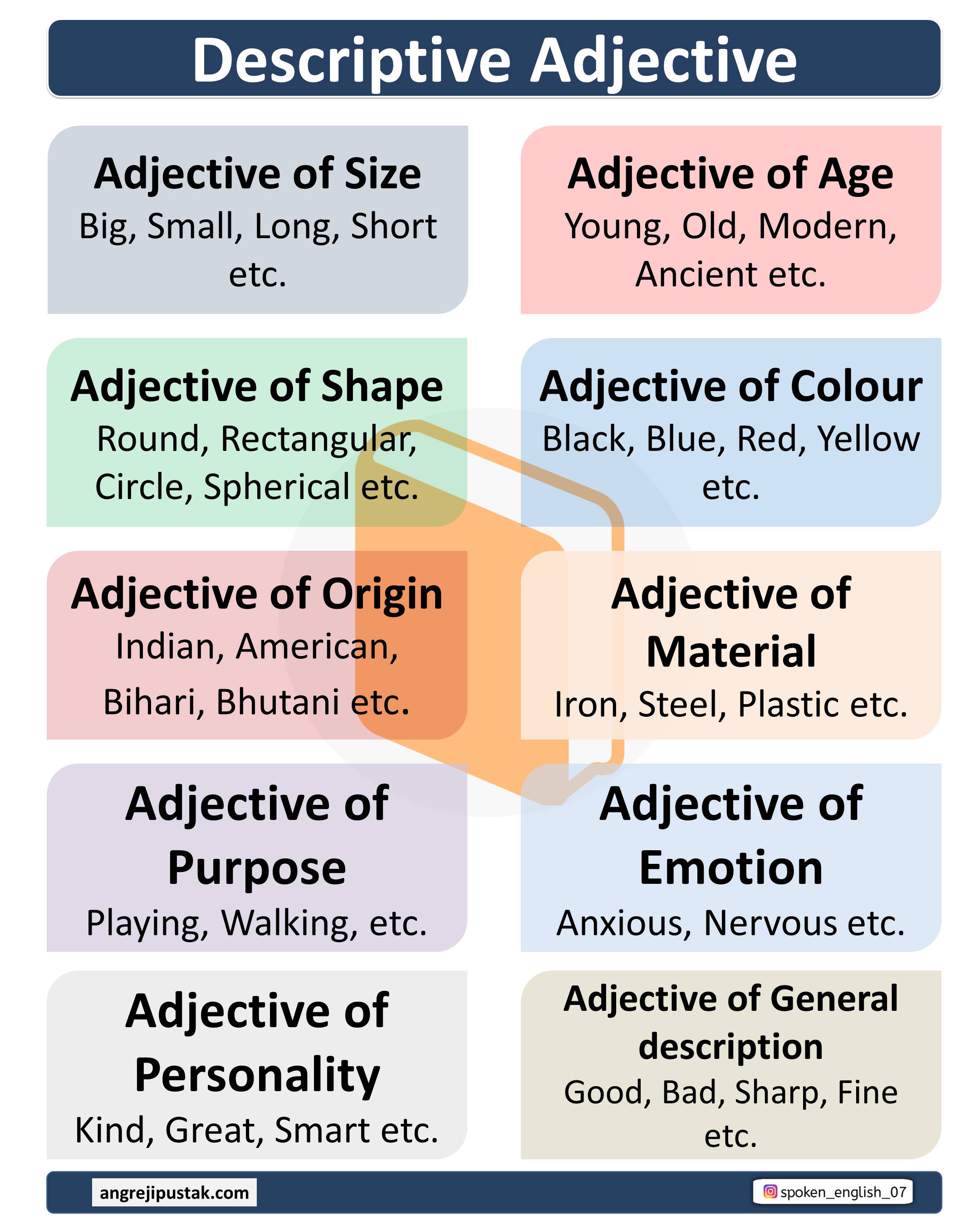Table of Contents
Adjective Definition in Hindi
वह शब्द जो Noun या Pronoun की विशेषता बतलाता है, वह Adjective कहलाता है। Example- Brown, Black, Some, Five, Good, Intelligent etc.
निचे दिए गए sentences को देखिये –
- He is industrious.
- Ram is honest.
- You are a good boy.
प्रथम sentence में Industrious (adjective) जो he (pronoun) की विशेषता बतला रहा है| दुसरे sentence में भी honest (adjective) जो Ram (noun) की विशेषता बतला रहा है| तीसरे sentence में good (adjective) जो boy (noun) की विशेषता बतला रहा है|
तो अब आप समझ गए होंगे की वैसे words जो noun या pronoun की विशेषता बतलाने का काम करता है वह adjective कहलाता है|
Adjective की पहचान कैसे करे?
- Concept 1: दुनिया की वो तमाम चीजे जो यह जबाब देती है:
- कैसा है – Good, Beautiful, Intelligent, Honest, Intelligent, Sweet, Testy, Blue, Red etc.
- कितना है – Some, Few, Many, Little, One, Two, Five etc.
- किसका है – My, His, Her, Our, Your, Its, Their ( ये मात्र 7 words होते है )
- Concept 2: वैसे words जिसके अंत में al, ic, ical, an, one, ar, tic, id, ed, ine, one, ish, ive, ory, our रहे ज़्यदा सम्भावना है की वह word Adjective ही होगा।
Types of Adjective (Adjective कितने प्रकार के होते है)
There are ten kinds of Adjective
- Proper Adjective
- Descriptive Adjective
- Quantitative Adjective
- Numeral Adjective
- Demonstrative Adjective
- Distributive Adjective
- Possessive Adjective
- Emphasizing Adjective
- Interrogative Adjective
- Exclamatory Adjective
Proper Adjective in Hindi
वह Adjective जो proper Noun से बनता है और Proper Noun की विशेषता बतलाता है। इसका formation सामान्यतः Proper Noun के suffix में …..i, ….ese, ….ian, ….ish, …n, ….vian etc. जोड़ने से होता है।
Example –
[wptb id=780]
Note – Proper Adjective के पहले the तथा अंत में s जोड़ने से समस्त जनता का बोध होता है। Example – Indian (भारतीय) – The Indians – (समस्त भारत की जनता)

Descriptive / Qualitative Adjective In Hindi
जो Adjective किसी Noun या Pronoun के गुण, दोष, रंग, रूप, आकर, प्रकार etc. को दर्शाता हो, उसे Descriptive Adjective या Qualitative Adjective कहा जाता है। Example – Tall, Short, Red, Black, Honest etc.
Some Important Concepts/Rules of Descriptive Adjective
- यदि किसी sentence में Descriptive Adjective का प्रयोग किसी Noun के पहले होता है, तब इसे Attributive use of Descriptive Adjective कहते है। Example –
- You are a tall student.
- This is a red pen.
- We have a square flat.
- She is young girl.
- यदि किसी sentence में Descriptive Adjective का प्रयोग किसी Noun या Pronoun के बाद होता है तो उसे Predicative use of descriptive Adjective कहते है। Example –
- This pen is black.
- Seema is tall.
- The flat is square.
- The book is old.
- जब किसी sentence में दो Descriptive Adjective का प्रयोग किसी एक ही Noun या Pronoun के लिए किया जाता है तो उसे सामान्यतः निम्न Order (क्रम) में रखा जाता है।
- Adjective of Size – Big, Small, Long, Short etc.
- Adjective of General description – Good, Bad, Sharp, Fine etc.
- Adjective of Age – Young, Old, Modern, Ancient etc.
- Adjective of Shape – Round, Rectangular, Circle, Spherical etc.
- Adjective of Colour – Black, Blue, Red, Yellow etc.
- Adjective of Origin – Indian, American, Bihari, Bhutani etc.
- Adjective of Material – Iron, Steel, Plastic etc.
- Adjective of Purpose – Playing, Walking, etc.
- Adjective of Emotion – Anxious, Nervous etc.
- Adjective of Personality – Kind, Great, Smart etc.

Quantitative Adjective in Hindi
जिस Adjective का प्रयोग sentence में मात्रा का बोध करने के लिए किया जाता है उसे Quantitative Adjective कहते है। इसके साथ हमेशा Material Noun का प्रयोग किया जाता है।
Quantitative Adjective – Much, A good deal of, A great deal of, little, enough, all, no, some, whole etc.
Example –
- The baby has drunk much milk.
- There is much water in the river.
- They have sold the whole gold.
Numeral Adjective in Hindi
वह Adjective जो संख्या को दर्शाता है, उसे Numeral Adjective कहते है। इसके साथ हमेशा Countable Noun का प्रयोग किया जाता है।
Numeral Adjective दो प्रकार के होते है।
1) Definite – One, Two, Three, First, Second, Fifth, Single, Double Triple etc.
2) Indefinite – Many, few, a few, the few, all, enough, most, no, some etc.
Example –
- There are many boys in the class.
- Some boys are reading.
- We have two hands.
- He is the first boy in the class.
- There are enough books in my library.
Demonstrative Adjective in Hindi
sentence में जिस Adjective का प्रयोग निकट या दूर के Noun या Pronoun की विशेस्ता बतलाने लिए किया जाता है, उसे Demonstrative Adjective कहते है। Example – This, that, these, those, certain, other, such, any, etc.
Some Important Concepts/Rules of Demonstrative Adjective
- This / that / कुछ Demonstrative Adjective के साथ हम हमेशा Singular Noun का ही प्रयोग करते है। Example –
- This pen is red.
- This pen is costly.
- This boy is stronger than you.
- That boy is laborious.
- कुछ Demonstrative Adjective के साथ हेमशा Plural Noun का ही प्रयोग करते है। These, Those, certain और other के बाद हमेशा PCN का प्रयोग होगा। Example –
- These boys are good.
- Those boys are good.
- Certain boys are good.
- Other boys are good.
- I can help you on certain conditions.
- कुछ Demonstrative Adjective ऐसे है, जिनके साथ Singular और Plural दोनों ही Noun का प्रयोग करते है। – Such, Any Example –
- Such boy is good.
- Such boys are good.
- Note – Another का प्रयोग singular Noun के साथ तथा Other का प्रयोग Plural Noun के साथ सकारात्मक sentences में किया जाता है। Example –
- I have written another book.
- I have written other books.
- Note – Any other का प्रयोग singular और Plural दोनों ही noun के साथ हमेशा negative sentences में किया जाता है। Example –
- They have not done any other mistake.
- They have not done any other mistakes.
Some Important Rules – Structure
A/an/a certain/this/that/another + SCN
Example –
- I met a certain boy. – Correct
- I met a certain boys. – Incorrect
Such/the same/any/the other + SCN/PCN
Example –
- I don not like such a book.
- I don’t like such books.
- This is the same book.
- You can take any pen.
- You can take any pens.
Certain/other/these/those + PCN
Example –
- I met certain passenger. – Incorrect
- I met certain passengers. – Correct
Distributive Adjective In Hindi
जिस Adjective का प्रयोग sentence में दो या दो से अधिक वस्तुओ या व्यक्तियों में से प्रत्येक, एक का या एक भी नहीं का बोध करने के लिए किया जाता है, उसे Distributive Adjective कहते है। – Each, every, either, neither
Some Important Ruses/Concepts
- Each का प्रयोग दो या दो से अधिक व्यक्तियों या वस्तुओ में से प्रत्येक के अर्थ में किया जाता है।
- Every का प्रयोग दो से अधिक व्यक्तियों या वस्तुओ में से प्रत्येक के अर्थ में किया जाता है।
- Neither का प्रयोग दो में से कोई नहीं के अर्थ में किया जाता है।
Note – Each / Every / Either / Neither के singular Noun तथा Singular Verb का प्रयोग किया जाता है।
Example –
- Each boy has come.
- Every boy has come.
- Every girl of this batch is intelligent.
- Either boy can do the sum.
- Neither pen writes well.
Possessive Adjective in Hindi
जिस adjective का प्रयोग सम्बन्ध या अधिकार बताने के लिए किया जाता है, उसे possessive adjective कहते है| sentence में possessive adjective के बाद हमेशा noun का प्रयोग किया जाता है| Example – My pen, His bag, Your book etc.
Note – Possessive case के सभी Noun और Pronoun को possessive adjective कहते है|
Example –
- This is your. – Incorrect
- This is your book. – Correct
Emphasizing Adjective in Hindi
जिस Adjective का प्रयोग किसी noun पर विशेष दबाव डालने के लिए किया जाता है, उसे Emphasizing Adjective कहते है| Example – Own, Very
- I saw you with my own eyes. (मैंने अपनी आँखों से तुमको देखा)
- This is her own book. (यह उसकी अपनी पुस्तक है)
- This is the very person who has done this work. (यह वही व्यक्ति है जिसने यह काम किया है)
Interrogative Adjective in hindi
जिस Adjective का उपयोग questions के लिए किया जाता है उसे Interrogative Adjective कहा जाता है| Example – Whose, What, Which
- Which book is the best?
- Whose motorcycle is this?
- What types of job do you want to do?
Exclamatory Adjective in Hindi
जिस Adjective का प्रयोग भाव की विशेषता बताने के लिए किया जाता है, उसे Exclamatory Adjective कहते है|
Example –
- What a beautiful scene this is!
- What an idea!
- What nonsense this is!
- What a great day!
